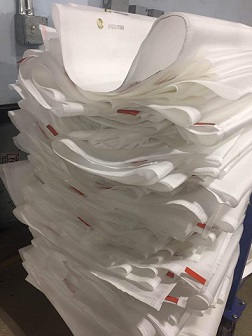When selecting filter press cloth fabrics for demanding pressure filtration projects, there are many choices. Fiber type, the weight of the fabric, its thickness, type of weave, and finish are all important.
Filtration fabric suppliers typically describe their materials in weight per unit area of the dry fabric. In the specifications, this is referred to as “Weight” and the units are oz./square yard or grams/square meter.
To fully understand filter cloth terminology and textile lingo, we need to start with the fibers themselves. A single fiber is usually referred to as a filament.
Monofilament, Multifilament & Spun Yarns

Micronics offers fabrics for a variety of demanding applications such as this Polypropylene (PP) Monofilament/Multifilament (“Mono/Multi”) Filter Press Cloth used in the beverage industry. Contact us to get the right cloth specification for your application.
Monofilament (“Mono”) yarns are single, straight heavier extrusions.
If instead of being straight, the filaments are twisted to hold the fibers together, the bundle is called a Multifilament (“Multi”) yarn.
Spun (staple) yarns are produced using a cotton or woolen manufacturing system which essentially combs short fibers into one direction and then twists them together. Continuously extruded synthetic filaments are chopped into short lengths so that they may be processed into yarn.
If you look at the roll of fabric, some of the yarns run in the direction of the roll and are continuous for the entire length of the roll. These are the warp yarns or ends. The short yarns which run crosswise to the roll direction are called either weft or fill or picks.
Fabric count refers to the number of warp yarns and weft yarns per inch or centimeter.
Example: a 24 x 22 fabric has 24 ends or warp yarns in every inch of fill direction and 22 picks in every inch of warp direction. You count warp yarns in the fill direction and you count fill yarns in the warp direction.
The weave describes how the warp and weft yarns are interlaced. The most popular weaves are plain, twill satin, and crowfoot satin. The weave is an important determinant in the cloth’s filtration characteristics which include particle retention, ease of filter cake release, tensile strength & more.
Micronics manufactures filter cloths using monofilament, multifilament and spun synthetic fibers. Commonly used materials include polypropylene, polyester, nylon, Rilsan(R), and more.
Confused? Don’t be. Our filtration experts will help you determine what combination of material, yarns (warp and weft), weave, weave pattern, fabric weight & finish are right for your application. Chances are that we already have long-standing experience with your slurry-type and can help you optimize your filter press manufacturing operation.
Contact us to learn more about filter cloth selection; it’s both an art and a science! You can trust the team at Micronics to put our liquid-solid separation expertise to work for you!
Categories
Featured Posts
- Micronics Announces
Strategic Acquisition of
SOLAFT® Filtration Solutions - Chennai Office Inauguration
- Micronics Engineered Filtration Group Announces Strategic Acquisition of AFT®, Dry Filtration Solutions Leader, from FLSmidth
- The Power of Teamwork
- Building a High-Performance Team: Key Factors for Success
- Micronics’ CEO, Chris Cummins, Is Featured On “Manufacturing Excellence” Podcast
- Micronics Announces Large, Multi-plant Filter Press Order for Lithium-Ion Battery Recycling for EVs
- Micronics Engineered Filtration Group Announces Strategic Acquisition of Trusted Filtration Industry Leader, National Filter Media (“NFM”)
Contact Our Experts
Micronics Is Your Trusted Partner for Total Engineered Filtration Solutions. We offer end-to-end solutions from Filter Media to Industry-Leading Filtration Equipment, to Spare Parts & Accessories, to On-Site Field Services and In-House Laboratory Services. Whether for your Filter Press, Belt Press, Leaf Filter, Vacuum Filter, or Baghouse, you can count on Micronics’ deep industry and applications knowledge for the right engineered filtration solution to meet your needs. We look forward to working with your team.
